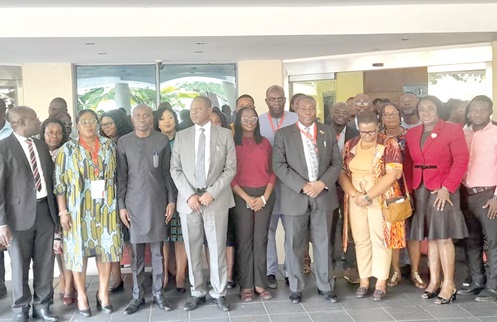
Make HIV self-testing affordable — Dr Kuma-Aboagye
The Director-General of the Ghana Health Service (GHS), Dr Patrick Kuma-Aboagye, has called on partners to help make HIV self-testing widely available and affordable, especially in rural and underserved communities.
He explained that self-testing could break down barriers such as stigma and fear and enrich individuals who might not otherwise engage in traditional testing services.
“In recent years, self-testing has emerged as a powerful tool, offering people opportunity to know their status in the comfort of their homes.
“We must promote self-testing as a game-changer. To scale this up, we must create a supportive environment, increase access and educate people on its benefits,” the D-G added.
He was speaking at an HIV/STI research dialogue series organised by the GHS and the National AIDS/STI Control Programme (NACP), as part of the 20th anniversary celebration of the introduction of Antiretroviral (ART) medicine in the country.
The event aimed to highlight the critical role research had played in shaping and improving HIV programmatic interventions in the country.
Research
Dr Kuma-Aboagye called for more research into HIV to drive innovation towards the end of the HIV epidemic.
“We must be relentless in exploring new and better ways to prevent, treat and ultimately eradicate HIV in Ghana.
“This means that we have to strengthen our research infrastructure. We have been working towards establishing two new centres in Western North and Savannah regions to boost the number of research centres in the country,” he said.
The D-G further called for support for researchers and investment in studies that would answer most pressing questions related to HIV.
Impact
The Programme Manager of NACP, Dr Stephen Ayisi Addo, mentioned the impact of the introduction of ART in the country’s HIV fight to include improvement in household incomes, reduction in the cost of health care, stigma related to the disease, and the enhancement of social life.
“Treatment has also reduced burdens on homes. We also used to have many orphans because of death from HIV, but antiretroviral therapy has reduced the number of orphans.
“So if we are celebrating, it's not just about numbers, but about human lives. It's about impact on the individual,” he said.
Barriers
The Deputy Director, Programmes, Ghana AIDS Commission, Derick Oppong-Agyare, said stigma and discrimination remained formidable in the barriers to progress, and that it was only by breaking down those barriers that there would be a way forward for those affected by HIV response.
For his part, a programme management officer of the World Health Organisation Ghana Office, Dr Uzoma Ajegbo, said the fight against HIV was far from over as new challenges continued to emerge, including drug resistance and the stigma and discrimination faced by people living with HIV.
